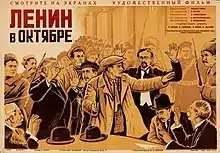Lenin in October
Lenin in October (Russian: Ленин в Октябре, romanized: Lenin v oktyabre) is a 1937 Soviet biographical drama film directed by Mikhail Romm and Dmitri Vasilyev and starring Boris Shchukin, Nikolay Okhlopkov and Vasili Vanin.[1] Made as a Soviet-realist propaganda work by the GOSKINO at the Mosfilm studio, it portrays the activities of Lenin at the time of the October Revolution. All Stalin scenes were expunged from the film for its reissue in 1958.
| Lenin in October | |
|---|---|
 | |
| Directed by | Mikhail Romm Dmitri Vasilyev |
| Written by | Aleksei Kapler |
| Starring | Boris Shchukin Nikolay Okhlopkov Vasili Vanin |
| Music by | Anatoly Alexandrov |
Production company | |
Release date | 7 November 1937 |
Running time | 105 minutes |
| Country | Soviet Union |
| Language | Russian |
The movie was followed by Lenin in 1918, which was made two years later.
Cast
- Boris Shchukin as Vladimir Lenin
- Nikolay Okhlopkov as Vasily, bolshevik and Lenin's bodyguard
- Vasili Vanin as Matveyev, bolshevik
- Vladimir Pokrovsky as Felix Dzerzhinsky
- Nikolai Arsky as Blinov, worker
- Yelena Shatrova as Anna Mikhailovna
- Klavdiya Korobova as Natasha, Vasily's wife
- Nikolai Svobodin as Valerian Rutkovsky, the Social Revolutionary
- Viktor Ganshin as Zhukov, the Menshevik
- Vladimir Vladislavsky as Karnaukhov
- Aleksandr Kovalevsky as Alexander Kerensky
- Nikolai Sokolov as Mikhail Rodzianko
- Nikolai Chaplygin as Kirilin
- Ivan Lagutin as Filimonov
- Semyon Goldshtab as Joseph Stalin (in the first version of movie)
- Sergei Tsenin as Pavel Malyantovich (uncredited)
- Anatoli Papanov as worker (uncredited)
Production
Stalin wanted a film that showed the October Revolution and the men responsible for it, just in time for its twentieth anniversary. As soon as Alexei Kapler's scenario was approved by the highest authorities, Lenin in October was put into production on August 10, already late in the year. The only director available was Mikhail Romm. Lenin in October was ready for release on November 7, only three months after the shooting commenced.[2]
References
- Rollberg p.499
- Jay Leyda (1960). Kino: A History of the Russian and Soviet Film. George Allen and Unwin. p. 339.
Bibliography
- Rollberg, Peter. Historical Dictionary of Russian and Soviet Cinema. Scarecrow Press, 2008.